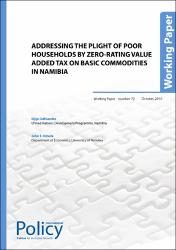Please use this identifier to cite or link to this item:
https://repositorio.ipea.gov.br/handle/11058/15119Full metadata record
| DC Field | Value | Language |
|---|---|---|
| dc.contributor.author | Odhiambo, Ojijo | |
| dc.contributor.author | Odada, John E. | |
| dc.date.accessioned | 2024-10-03T23:51:18Z | - |
| dc.date.available | 2024-10-03T23:51:18Z | - |
| dc.date.issued | 2010 | |
| dc.identifier.uri | https://repositorio.ipea.gov.br/handle/11058/15119 | - |
| dc.description.abstract | Difficult economic times began for Namibia in 2008 as real economic growth suddenly dropped to 4.3 per cent from the 5.5 per cent recorded in 2007. There were also wide fluctuations in the general level of prices of goods and services, including food commodities. Cost-of-living inflation rose to a high of 10.4 per cent from a low of 2.3 per cent in 2003 and unemployment rates were high, well in excess of 50 per cent; thus many households faced an increasing cost of living without reliable sources of income. The unfavourable circumstances of these households were exacerbated by inauspicious climatic and soil conditions, which greatly limit the role of subsistence farming as a viable source of livelihood in many parts of the country. In order to mitigate the impact of rising food prices and address food security concerns, the government decided to increase from eight to fourteen the number of basic commodities (foodstuffs and services) that had zero-rated value added tax (VAT) in 2000, as a means of improving access to basic foodstuffs and services needed for daily survival, particularly for the poor. This paper offers an ex-ante analysis of how the zero-of rating VAT on these basic commodities affected the well-being of poor households. We use data from the 1993/94 and 2003/04 National Household Income and Expenditure Survey and a mini survey conducted in 2009 to determine the consumption patterns of these commodities. The VAT burden lifted is determined and disaggregated by income decile. The analysis reveals that, contrary to expectations, rich households are more likely to benefit from VAT zero-rating than poor households. The findings of the study make it plausible to conclude that the zero-rating of VAT on basic commodities in 2000 and 2008 did not adequately target the commodities that the poor consume in large quantities and that they acquire in formal markets; hence the measure is unlikely to bring additional benefits to the poor. The government might have to reconsider the choice of VAT zero-rated commodities and include those that are consumed mostly by the poor and acquired in formal markets, while simultaneously strengthening and expanding other schemes such as social transfers which would benefit the poor disproportionately. (...) | en |
| dc.language.iso | en | |
| dc.title | Addressing the Plight of Poor Households by Zero-Rating Value Added Tax on Basic Commodities In Namibia | en |
| dc.type | Working Paper | |
| dc.rights.holder | International Policy Centre for Inclusive Growth | |
| dc.rights.holder | United Nations Development Programme | |
| dc.location.country | Brasil | |
| dc.description.physical | 20 p. : il. | |
| dc.rights.type | Licença total exclusiva | |
| dc.rights.license | O texto e dados desta publicação podem ser reproduzidos desde que as fontes sejam citadas. Reproduções com fins comerciais são proibidas. | |
| dc.subject.keyword | Tax | |
| dc.subject.keyword | Basic Commodities | |
| dc.subject.keyword | Namibia | |
| ipea.access.type | Acesso Aberto | |
| ipea.researchfields | N/A | |
| ipea.classification | Comércio Interno | |
| ipea.classification | Economia. Desenvolvimento Econômico | |
| ipea.classification | Saneamento | |
| ipea.classification | Saúde | |
| Appears in Collections: | Publicações do IPC-IG | |
Files in This Item:
| File | Description | Size | Format | |
|---|---|---|---|---|
| en_IPCWorkingPaper72.pdf | 732.26 kB | Adobe PDF |  View/Open |
Items in DSpace are protected by copyright, with all rights reserved, unless otherwise indicated.

